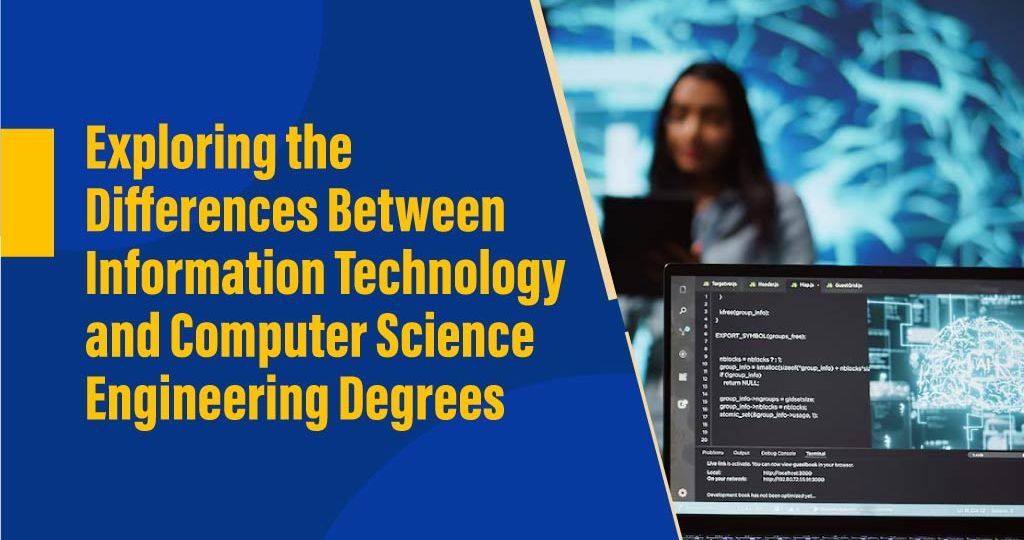
Technology-related occupations are in high demand in today’s quickly changing digital environment, and students frequently have to decide between degrees that seem comparable but have clear distinctions. Computer science engineering (CSE) and information technology (IT) are two examples of such possibilities. Although computers and the digital world are fundamental to both areas, their emphasis, curricula, career options, and real-world applications differ greatly. To assist you in choosing your professional route, we’ll go over the main differences between computer science engineering, and information technology in this blog.
Understanding the core concepts of IT and CSE
Prior to exploring the differences, it is crucial to understand the fundamentals of both disciplines:
Information Technology (IT): This field is mostly concerned with using technology in real-world situations to address organizational or corporate problems. IT specialists are in charge of overseeing and executing computer networks and systems, making sure that digital infrastructure runs smoothly. System administration, security, database management, and making sure that a business has dependable communication networks are all common tasks for them.
Computer science engineering, or CSE: It is more expansive and theoretical. It is concerned with the creation of computing processes, algorithms, and software. CSE specialists frequently work with programming, create new technologies, and comprehend computer hardware. Their knowledge goes beyond system administration to encompass the investigation and creation of novel advancements in computing.
Curriculum Differences
Examining the curriculum and academic structure of these two degrees is an important approach to distinguish between them. Both programs include a variety of computer-related topics, but they differ in terms of concentration and level of detail.
Curriculum for Information Technology:
Courses on the application of technology to practical situations will be studied by IT students at the best B.tech IT colleges in coimbatore. Typical topics covered in an IT degree program are as follows:
Security and network management
Database programs
Cloud computing and web development
System management
Project management for IT
Data structures
IT students will gain knowledge on managing IT resources, ensuring an organization’s infrastructure is operating at peak efficiency, and applying current technology to solve business problems.
Curriculum for computer science engineering
CSE is centered on the theoretical and scientific underpinnings of computing. Computer science engineering colleges in coimbatore offer the following syllabus in their curriculum.
Data structures and algorithms
System environments
Both machine learning and artificial intelligence
Engineering software
networks of computers
Security and cryptography
Architectures of computers
The CSE curriculum places a strong emphasis on software creation, coding, and comprehending the fundamental ideas underlying how technology functions at a detailed level.
Skillsets Gained
Although degrees in CSE and IT both provide essential skill sets, the nature and application of the talents learned in each area vary.
IT Skills:
Solving issues in organizational and business settings.
Strong grasp of IT infrastructure administration.
Proficiency in troubleshooting and system administration.
Practical familiarity with servers, networks, and databases.
Proficiency in cybersecurity and cloud-based technology.
Since their jobs frequently need them to coordinate with other departments to guarantee seamless technological integration, IT professionals typically possess exceptional project management and communication skills.
CSE Skill sets
Extensive knowledge of programming and coding in languages such as Java, Python, and C++.
Robust mathematical and analytical abilities for creating algorithms.
the capacity to create software from the ground up.
Proficiency with logic architecture, data structures, and computer systems.
Familiarity with modern computing technologies, AI, and machine learning.
Graduates of CSE programs are often creative thinkers who like working on cutting-edge computing systems, developing new software, and investigating theoretical ideas.
Career Opportunities
The professional options that a degree offers are among the most crucial considerations when selecting a degree. Although they serve different roles and industries, both CSE and IT provide outstanding job opportunities.
Career Options for IT Graduates:
Network administrator: overseeing and protecting company computer networks.
System Administrator: In charge of managing computer system setup and upkeep.
Database managers are responsible for upkeep and optimization of databases to guarantee safe and effective data storage.
IT consultant: Assisting companies in making the most of their technological assets to increase productivity.
Cybersecurity Analyst: By putting strong security measures in place, I defend enterprises against cyber threats.
IT graduates are frequently engaged in positions that center on maintaining an organization’s technological infrastructure.
Career Options for CSE Students
Software Developer: Creating, testing, and maintaining software applications.
Data Scientist: Analyzing complex data sets to derive insights and inform business decisions.
AI Engineer: Developing intelligent systems and machines that can learn and adapt.
Systems Engineer: Designing and optimizing computer systems for better performance.
Research Scientist: Making contributions to the development of cutting-edge technologies and computer science.
Graduates of CSE programs are more likely to work in roles related to innovation, research, and development, where they will create new technologies and push the envelope of what is conceivable.
Which One Is Right for You?
Your hobbies and professional objectives will ultimately determine whether you choose computer science engineering or information technology. An IT degree can be the best option if you’re interested in managing IT infrastructure, maintaining systems, or using current technologies to solve real-world issues. However, CSE might be a better fit if you adore coding, are enthralled with computer mechanics, and want to be at the forefront of technical progress. Understanding the Differences between CSE & IT
Because of the IT industry’s ongoing expansion, graduates of both IT and CSE schools may anticipate exciting and fulfilling jobs in both disciplines.


